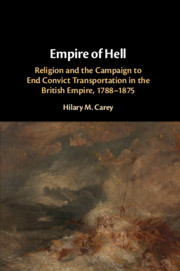 Empire of Hell
Empire of Hell Book contents
- Empire of Hell
- Empire of Hell
- Copyright page
- Dedication
- Contents
- Tables
- Acknowledgements
- Abbreviations
- 1 Introduction
- 2 Saints, Whigs and Penal Colonies, 1788–1822
- 3 ‘Hell upon Earth’: Sir George Arthur in Van Diemen’s Land, 1823–1837
- 4 Quakers and Convict Concerns
- 5 Christian Utilitarianism and Archbishop Richard Whately
- 6 Catholics, Protestants and the ‘Horrors of Transportation’
- 7 ‘Ocean Hell’: Captain Maconochie and Norfolk Island, 1837–1855
- 8 Probation in Van Diemen’s Land, 1839–1857
- 9 ‘Political Parsons’ and the Anti-Transportation Movement, 1847–1854
- 10 ‘Floating Hells’: Bermuda, Gibraltar and the Hulks, 1850–1875
- 11 ‘Reformatory Colony’: Western Australia, 1850–1868
- 12 Conclusion
- Bibliography
- Index
5 - Christian Utilitarianism and Archbishop Richard Whately
Published online by Cambridge University Press: 08 March 2019
- Empire of Hell
- Empire of Hell
- Copyright page
- Dedication
- Contents
- Tables
- Acknowledgements
- Abbreviations
- 1 Introduction
- 2 Saints, Whigs and Penal Colonies, 1788–1822
- 3 ‘Hell upon Earth’: Sir George Arthur in Van Diemen’s Land, 1823–1837
- 4 Quakers and Convict Concerns
- 5 Christian Utilitarianism and Archbishop Richard Whately
- 6 Catholics, Protestants and the ‘Horrors of Transportation’
- 7 ‘Ocean Hell’: Captain Maconochie and Norfolk Island, 1837–1855
- 8 Probation in Van Diemen’s Land, 1839–1857
- 9 ‘Political Parsons’ and the Anti-Transportation Movement, 1847–1854
- 10 ‘Floating Hells’: Bermuda, Gibraltar and the Hulks, 1850–1875
- 11 ‘Reformatory Colony’: Western Australia, 1850–1868
- 12 Conclusion
- Bibliography
- Index
Summary
- Type
- Chapter
- Information
- Empire of HellReligion and the Campaign to End Convict Transportation in the British Empire, 1788–1875, pp. 101 - 122Publisher: Cambridge University PressPrint publication year: 2019


